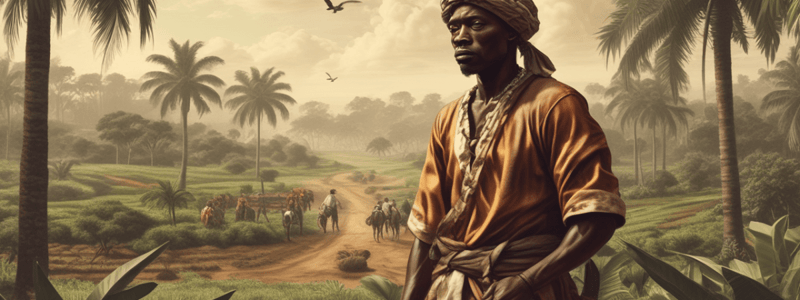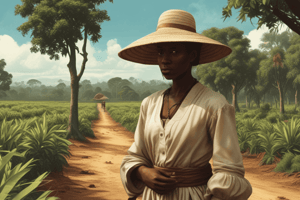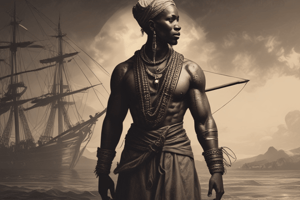Podcast
Questions and Answers
What was the status of family life for enslaved Africans prior to 1823?
What was the status of family life for enslaved Africans prior to 1823?
- Promoted through educational initiatives
- Prohibited by law, enabling planters to separate families at any time (correct)
- Encouraged and supported by the planters
- Frequently celebrated with elaborate ceremonies
Why were blowing horns or beating drums forbidden for enslaved Africans?
Why were blowing horns or beating drums forbidden for enslaved Africans?
- They were harmful to the environment
- They were seen as too loud and disruptive
- They were considered ineffective forms of communication
- They enabled Africans to communicate with each other (correct)
What was the fate of enslaved Muslims in terms of practicing their beliefs?
What was the fate of enslaved Muslims in terms of practicing their beliefs?
- They had to hide their beliefs but could practice in secret
- They were allowed to openly practice but only in designated areas
- They were encouraged to practice freely
- They were prohibited from practicing their belief (correct)
Why were enslaved Africans forced to accept European religious practices and beliefs?
Why were enslaved Africans forced to accept European religious practices and beliefs?
What was the consequence for an enslaved person caught learning to read?
What was the consequence for an enslaved person caught learning to read?
Why did planters take advantage of the lack of family protection laws before 1823?
Why did planters take advantage of the lack of family protection laws before 1823?
What was one way in which the economic life of enslaved Africans was controlled on sugar plantations?
What was one way in which the economic life of enslaved Africans was controlled on sugar plantations?
How did some planters enforce physical control over enslaved persons on sugar plantations?
How did some planters enforce physical control over enslaved persons on sugar plantations?
What was one consequence of laws that prevented enslaved Africans from leaving the plantation without permission?
What was one consequence of laws that prevented enslaved Africans from leaving the plantation without permission?
How did laws enacted by the planters affect the economic freedom of enslaved Africans?
How did laws enacted by the planters affect the economic freedom of enslaved Africans?
What was a social control measure imposed on enslaved Africans on sugar plantations?
What was a social control measure imposed on enslaved Africans on sugar plantations?
Why did planters impose curfews on enslaved individuals on sugar plantations?
Why did planters impose curfews on enslaved individuals on sugar plantations?
Study Notes
Family Life and Social Control
- Family life of enslaved Africans was not encouraged, and planters could legally separate families at any time until the 1823 amelioration measures prohibiting family separation were passed.
- Enslaved Africans were forced to celebrate and practice Western holidays, and their own cultural practices, such as blowing horns or beating drums, were forbidden.
- African Spiritualism and Islamic beliefs were prohibited, and enslaved Africans were forced to accept European religious practices and beliefs.
Education and Literacy
- Enslaved Africans were prohibited from all forms of education, and reading or learning to read was a punishable crime.
- Anyone caught teaching an enslaved person to read would be severely whipped, and the enslaved individual themselves might suffer severe punishment, including savage beatings or the amputation of fingers and toes, for the "crime" of literacy.
Economic Control
- The economic life of enslaved Africans was controlled, making them dependent on the planter and less likely to try to free themselves.
- It was illegal for an enslaved person to own property without their master's consent.
- The size of their provision grounds was limited, preventing them from making a substantial profit or growing sufficient food to become independent and self-reliant.
- Planters enacted laws that prevented Africans from planting staple crops like cotton or sugar cane.
Physical Control
- Physical measures, such as placing enslaved persons in stocks, were used to control and punish them.
- Severe beatings, cutting off a limb, or even killing the enslaved were other forms of physical control used by planters.
- Laws restricted the movement of enslaved people on the islands, prohibiting them from leaving the plantation without permission.
- Relationships between enslaved people from one plantation to another were forbidden, and curfews were enacted to manage the movement and assembling of persons, preventing planning of events or revolts.
Studying That Suits You
Use AI to generate personalized quizzes and flashcards to suit your learning preferences.
Description
Explore the economic, physical, and social control exerted over enslaved Africans on sugar plantations. Learn about how their economic lives were restricted, leading to dependence on the plantation owners and limitations on property ownership.




